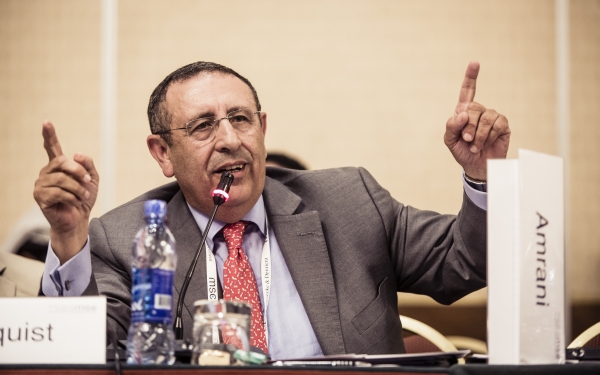
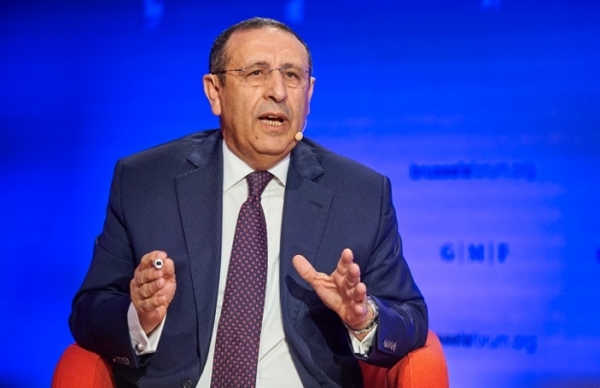
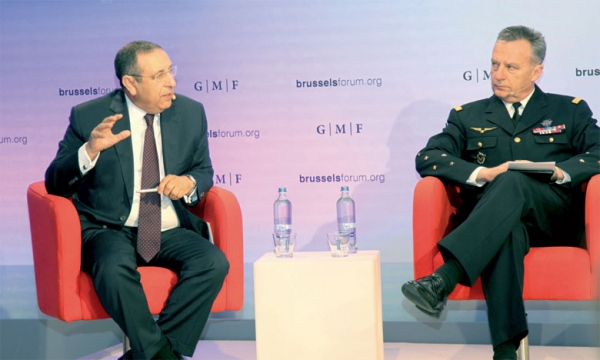
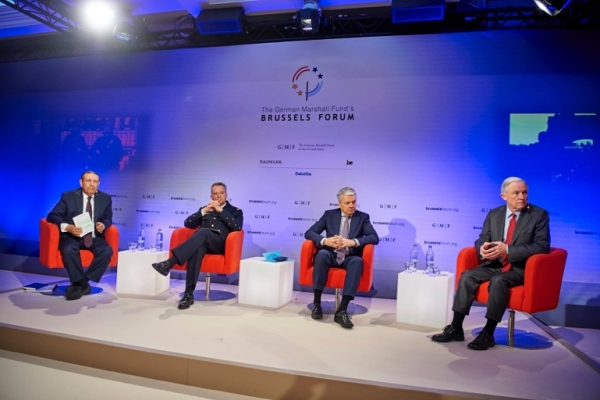
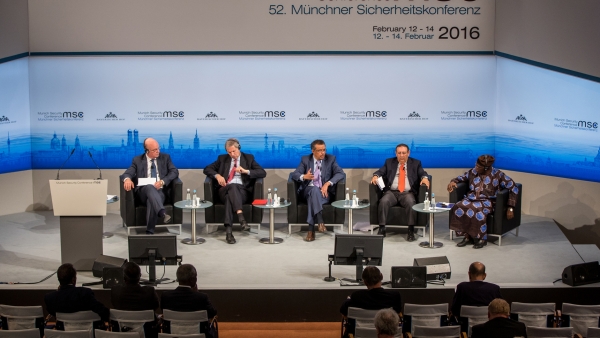
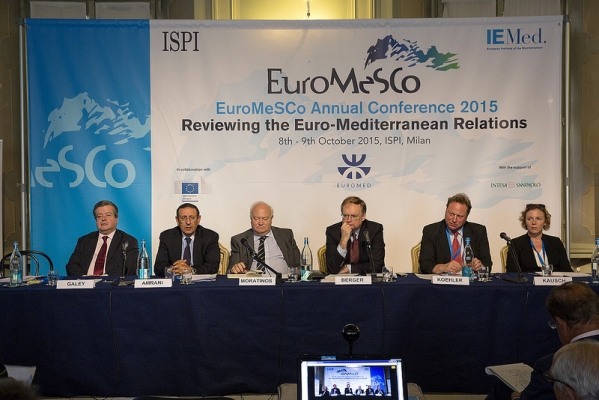
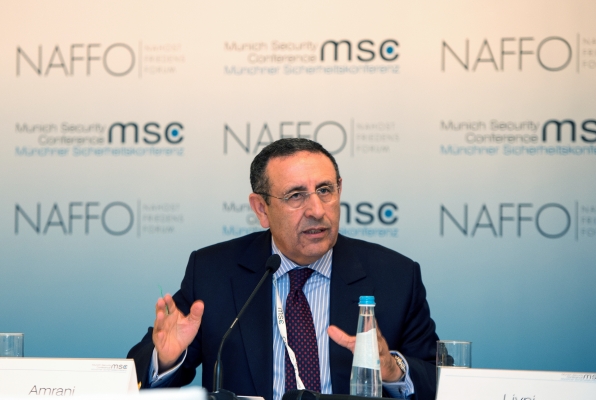
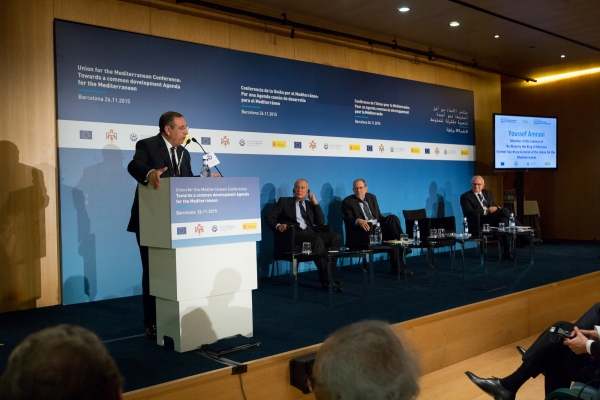
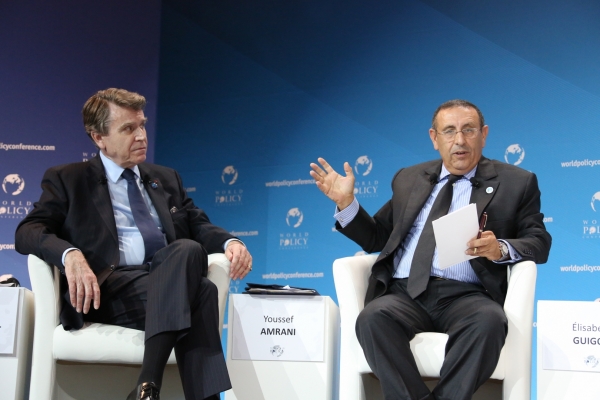
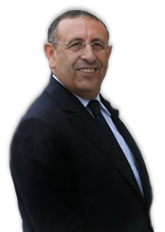

At the beginning of 2013, Youssef Amrani, Morocco’s Minister Delegate for Foreign Affairs and Cooperation reviewed the main features of Moroccan diplomacy in 2012, in an interview with Saad A. Tazi from Le Soir.
Youssef Amrani is Minister Delegate for Foreign Affairs and Cooperation in the Government of Abdelilah Benkirane. This Istiqlal stalwart is also a seasoned veteran of diplomacy. Four times ambassador, he has climbed all of the levels in the Ministry of Foreign Affairs to become the Secretary General between 2008 and 2011. Polyglot, jovial, and energetic, Youssef Amrani was willing to play the Question/Answer game with LE SOIR LES ECHOES. He provides a positive assessment of the actions undertaken by his ministry over the past year, but refuses all criticism of the Government to which he belongs as he defines himself as “disciplined soldier.” He concentrated his remarks on his area of expertise: the country’s continuity in its diplomacy; reframing the UN mediation on the Sahara; restructuring Morocco’s policies toward the Arab world; deepening relations with the European Union; diversification of partnerships, and operationalizing Morocco’s relationships in Africa.These are some themes developed in this interview with an emphasis on assessing 2012.
Q: After almost a year since the formation of the Government, it is customary to make a first year assessment. How do you evaluate Morocco’s foreign policy performance during the past year?
A: Your question creates a double issue. Firstly, it would be wrong of me to evaluate here what you have asked me. It is up to His Majesty the King, the Head of Government, the Parliament, and public opinion to take a scrutinizing look at Morocco’s performance. Secondly, it is a common mistake to confuse foreign policy and diplomacy, which, in fact, do not reflect the same facts. Let’s say, for simplicity, that the latter is the tool for implementing the former. Foreign policy is part of what constitutionalists call the strategic political orientations of the State.
Q: I will rephrase my question: how do you assess this year that you spent as Minister Delegate for Foreign Affairs?
A: I understand the meaning of your question. All I can say is that foreign affairs is the domain par excellence where the continuity of the State’s policies are expressed. Morocco’s foreign policy rests on a base of constants, which bestows it with durability and stability. To this must be added the inertia factor of international politics, which means that actions only work in the medium and long term. It is thus pointless to try to detect ruptures – however defined – that indicate how changes in political power would have impacted the diplomatic action of the State. We walk in continuity. Especially as foreign policy stems from a cross-sectional, structured, and methodical vision from His Majesty the King, who drives and is driven by the values and principles that move Morocco in its international relations. It is not for nothing that Moroccan diplomacy is a house of long tradition. Regarding my small role, 2012 was by 36th year in this big house.. We have the opportunity to check ourselves through an assessment that will come out from the process of your questions.
Q: OK. Let’s start with question number 1 in Morocco: that of the Moroccan Sahara. 2012 was marked by the polemic over the withdrawal of confidence from the UN envoy Christopher Ross. The decision has generated a lot of ink. Can you give us the final word on this story?
A: In all fairness, there is no final word.. You said it yourself: it is a polemic. For the record, know that we have never had a problem with Christopher Ross the individual, who is a courteous man with great experience. We had, at a certain point, serious reasons for questioning the integrity of his mandate, the relevance of his approach, and the objectivity of his approach. It was our duty, vis-à-vis the political process, the Security Council, and the Secretary General of the UN, to do so strongly and quickly. In politics, as in physics, power is force times velocity. It was imperative to prevent any backsliding. The United Nations response was not long in coming. It came August 25, 2012.
Q: You’re referring to the telephone conversation between His Majesty the King and the UN Secretary General Ban Ki-Moon?
A: Exactly. If I had to pick the most important date for the national question in 2012, that would be it. The discussion between His Majesty the King and Mr. Ban Ki-Moon reframed the UN mediation and revived the political process. It allowed for clarifying the framework, particularly with regards to respect for MINURSO’s mandate, commitment to the parameters of the political process as approved by the Security Council, the nature and the contours of the Personal Envoy’s mandate, without forgetting the central role of Algeria in facilitating a political solution to this regional dispute. We noted favorably the fact that this revival was strengthened by the Security Council on November 28. We recorded, on this occasion, the convergence of views expressed by Christopher Ross with the consistent position of Morocco, particularly with regard to the dangers related to security threats in the Sahel—threats are likely to worsen in the absence of a solution to the artificial dispute over the Sahara. In any event, Morocco is strong in its unshakable faith in the justness of his cause. It will continue to cooperate without complexes and in good faith with the United Nations to reach a final political solution through negotiation, on the basis of the Autonomy Initiative and in accordance with clearly defined parameters set by the Security Council–notably realism and a spirit of compromise.
Q: From what you say, 2012 would have been a lost year for the Sahara dossier, if it had not been for the incident with Ross.
A: I would not go that far. 2012 has seen several significant developments. I think retrospectively to the briefing of the Security Council on November 28; I think of the statement of complex realities that Mr. Ross certainly made during his visit to the region last November; I also think of Mr. Hervé Ladsous’, United Nations Under-Secretary-General for Peacekeeping Operations, visit to Morocco, in October, and of his vibrant tribute to Moroccan peacekeepers; I think of the nomination in June of Wolfgang Weisbrod-Weber as Special Representative of the Secretary General, or still yet of the Secretary General’s report and Security Council Resolution in April. Based on the evidence, 2012 wasn’t the year of the realization of a political solution that the international community has called for, but it was a year of constructive honesty. The need to refocus mediation on the center for the target, to better stay on course of the political solution is the lesson I learned from this exercise.
Q: In addition to the national question, what are the issues that have mobilized the diplomatic machine during the past year?
A: Moroccan diplomacy is the image of its international environment: it is hyperactive. To chose some examples, at the risk of being arbitrary, I would start with the Mali question, the Syrian crisis and the pursuit of a policy of diversification of partnerships through the implementation of the Strategic Dialogue with the United States, the establishment of a Strategic Partnership with Spain, the consolidation of exceptional relations with France, and the operationalization of the Advanced Status with the EU.
Q: Let’s start with the Syrian issue. Was the Marrakech Conference on December 12 the diplomatic success we are told it was?
A: Of course. With 130 delegations, of which half were represented at ministerial level, the meeting demonstrates Morocco’s capacity for international mobilization in support of the Syrian people. This conference constitutes a milestone on the road to the unification of the patriotic forces and of their recognition, through the Syrian National Coalition, as the legitimate representative of the Syrian people in the transition period. The King’s Message addressed to the participations of the conference encapsulated the essence of our national position, which underpins the mobilization of Moroccan diplomacy within the United Nations, the Arab League, the Organization of Islamic Cooperation, or even within the frame of the Group of Friends of the Syrian People, namely: the primacy of the humanitarian dimension, the pursuit of a political solution, the establishment of an inclusive process of democratic transition, the preservation even with adversity of the sovereignty and independence of Syria, and its national unity and territorial integrity. It is in this context that Morocco strongly mobilized to achieve the meeting of the Friends of the Syrian People on December 12.
But this success remains relative, until the spiral of violence in Syria is broken in favor of a democratic transition without exception. It is the Syrian people, in all their elements, who must remain the master of their destiny. Morocco and the international community are mobilized at their side and cannot substitute for them. It is for this reason that we work in the Security Council to promote a common position for the 15 members. It is also in this spirit that we support the efforts of the Joint Envoy of the UN and the Arab League, Mr. Lakhdar Brahimi. The number of victims and displaced persons has reached intolerable dimensions. All Moroccans are affected by this tragedy and His Majesty the King has personally ensured that Morocco demonstrates active solidarity with the Syrian people, as in 1973. It was on his instructions that the field hospital was deployed to Camp Zaatar; His Majesty was the first head of state to visit this camp on October 18, 2012.

Royal visit to wounded Syrians at the Zaatari hospital in Jordan.
Q: Staying in the region. We knew relations with the Gulf countries are good, but they have undergone an important evolution in 2012. What do you make of this?
A: Relations with the Gulf countries fall under the sign of the brotherhood of our peoples and the personal friendship which ties His Majesty the King to the Heads of States of the Gulf countries. They are exemplary to the extent that in 2011 the GCC invited our country to join it, in a strong gesture that singled out the relationship with Morocco is all of its depth. His Majesty, in the spirit of pragmatism, launched consultations with the GCC to move towards a true strategic alliance, and not only to complement traditional bilateral relations with a regional one. This process allowed for the formalization of an Action Plan 2012-2017, structured around seven thematic working groups, including in particular political dialogue, economic cooperation, judicial collaboration, and cultural cooperation. This is the Action Plan that was adopted last December 25, marking the culmination of a year and a half of diplomatic work. But the marker of 2012 is the official visit made by His Majesty to the Gulf countries and Jordan. It opened Morocco to great opportunities, notably through a mechanism to support development projects in Morocco, through the endowment of a fund of 5 billion dollars over 5 years. More than financial support, it is a long-term economic partnership that is put in place with a win/win logic. Political stability, the transparency of the business environment, and economic confidence are the advantages of Morocco. This pattern of cooperation constitutes a real benchmark. In the future, the relevance and effectiveness of joint Arab action will depend on the ability to generate synergies based on enhanced cooperation and tailored strategies. This new model of Arab cooperation is probably destined to be replicated by other countries in the same way that the relationships built by Morocco with the EU have guided the development of Euro-Mediterranean relations.
Q: Let’s discuss the European Union. Didn’t Morocco’s Arab policy take precedence over its relations with Europe? Hasn’t there been a sort of deceleration of the bilateral agenda with the European Union?
A: Deceleration in comparison to what?
Q: In 2011, the EU was at the top of Morocco’s international agenda. Is that not true?
A: It was. It remains so. I go back to the fundamental notion of the continuity of the State, which is central both in the conduct of diplomacy, and in its analysis of policies. This is clearly the situation when talking about the Morocco-EU Partnership, whose mechanisms have been building over time. Judge for yourself: the Association Agreement, which is still the general framework for relations between the EU and Morocco, has been in force since 2000. The National Indicative Program, which structures Morocco-EU financial cooperation, covers the period from 2011 to 2013. Advanced Status, which encapsulates the royal vision of overall relations with EU, has been in place since 2008, and its Action Plan, under negotiation since 2010, was finalized in 2012. The Agreement on Agriculture, which opens the European market to Morocco, entered into force in 2012, and the Fisheries Agreement covers the period from 2011 to 2015, and we are currently negotiating an implementation protocol. That is to say that there can be no deceleration, much less a deletion of the EU from Morocco’s diplomatic agenda. That was made impossible by the mechanisms and laws in place. It is also the philosophy of Morocco’s strategic collaboration with the EU, as desired by His Majesty the King.
Maybe there was a deceleration in the intensity of speech. But this reflects less of a weakening of political will – which remains intact on both sides – and more of a sort of prioritization of political discourse. The EU has spoken out more on the situation in Tunisia, Libya, and Egypt or even in Mali. From our side, accelerated political developments that Morocco has experienced have generated a form of refocusing on domestic issues, and among some even the illusion that the outside world is nothing more than an additional constraint. Attention was rightfully turned to reform policies and spent on domestic issues. It is the instinct of His Majesty that Morocco not stumble over false evidence and that it stay the course, even accelerate its policy of diversification of external partners. Not only have we continued to deepen relations with the EU, but we have also taken important qualitative steps in our relations with the United States, Spain, and France, just to name a few examples.

Royal Inauguration of the Casablanca Tramway with Jean-Marc Ayrault, French Prime Minister
Q: Let’s continue with the European Union if you wish.
A: Sure. I am confident in the development of relations with the EU. The royal vision of Advanced Status reinvented these relationships and placed them in a long term perspective.. 2012 has enabled us to take a further significant step in the realization of this vision through the completion of the Action Plan for Advanced Status, for which I had the honor of leading the negotiations in 2010-2011. The finalization of this Action Plan is an important step in the realization of the political ambition and common strategy that we have with the EU. It allows us to envision a new legal framework to replace the Association Agreement. Successful implementation of the Action Plan will open doors to achieve this goal.. Important projects are underway: the dialogue on migration, mobility and security, negotiations over services, discussion on a global and comprehensive Free Trade Agreement, regulatory convergence … 2013 promises to be very active. We will build on the work of the past year, especially the conclusions of the Council of Association which I co-chaired with the Danish Minister in April 2012, the consultations in January 2012 with my friend Stefan Füle [note: European Commissioner for Enlargement and European Neighborhood Policy], and the discussions in April with Maria Damanaki [note: European Commissioner of Maritime Affairs and Fisheries] to whom I repeated with cordial honesty the essential national facts with regards to cooperation with Europe. I don’t forget Catherine Ashton’s visit to Rabat in November, on the first since her appointment in 2009, which was an opportunity for her to observe the serenity and continuity of reforms in Morocco, with regards to the consolidation of the rule of law.
A final point of importance on relations with the EU: inter-parliamentary dialogue with the European Parliament, whose President, Mr. Martin Schultz, chose Morocco for his first official visit after his election in January 2012. This dialogue has been institutionalized thanks to the Advanced Status within the framework of the CPM [note: Joint Parliamentary Commission between the European Parliament and the Moroccan Parliament], which is now part of the architecture of our relations with the EU.. It shows that the partnership with the EU is one of Morocco’s geopolitical missions that transcend political divisions. Its contribution is important due to the active involvement of its members, particularly the co-chairs Abderrahim Atmoune and Yasmina Baddou. It is also thanks to the commitment of members who have passed on the torch, like Mbarka Bouaida and Latifa Jbabdi whose work I honor. And, finally, it is due to the continuity provided by the Dean of the Commission, who is my friend Layadi Fatiha, whose dynamism is well known. I also want to pay a very special tribute to my friend Zahra Cheggaf who has demonstrated exemplary patriotic engagement within the CPM, and who demonstrates equally exemplary courage in her fight. My thoughts and wishes go to her early this year.
Q: The launch of a Strategic Dialogue with the United States is clearly one of the achievements of Moroccan diplomacy in 2012. What is the interest in this new framework of cooperation?
A: This Strategic Dialogue is intended to elevate and deepen the already excellent relations with the United States, according to the common will of the two countries. It is to develop a high degree of dialogue and cooperation, and a more refined consideration of respective priorities. The joint communiqué of the first session of the Strategic Dialogue maps out an ambitious agenda focused on four areas, namely the political, economic, security, and cultural and educational. The United States praised the reforms and initiatives undertaken by His Majesty King Mohammed VI, while committing to work alongside Morocco toward the achievement of promising goals of the new Constitution, particularly in terms of social and human development. At the regional level, the Strategic Dialogue will help maintain the momentum of Maghreb integration, of which we agree on its importance. At the international level, we will deepen bilateral consultations at the level of international organizations, including within UN and its specialized agencies. In this context, the issue of security, particularly in the Sahel-Saharan region, is a common priority. Economic cooperation is also at the heart of the Strategic Dialogue. The aim is to explore new opportunities and promote the implementation of concrete and innovative projects in sectors with high added value. Held in Washington December 4, a Bilateral Conference on Business Development brought together a large delegation of businesswomen and businessmen from the two countries. In this context, the four initial sectors were identified, namely the aerospace, automotive, agriculture, and energy sectors. prospects of this Strategic Dialogue are very promising.
Q: What is your view on relations with Spain?
A: Relations are excellent and driven by a strong determination to move forward with the implementation of an innovative strategic partnership. I can do nothing but rejoice with regard to the qualitative evolution achieved in 2012. Mariano Rajoy chose Morocco for his first official trip abroad in January 2012. The Head of Government Mr. Abdelilah Benkirane’s visit to Madrid in May 2012 was also a highlight of the bilateral agenda. Foreign Minister Saad-Dine Otmani and I have also taken several work trips to Spain. I keep in constant contact with José Manuel García-Margallo and Gonzalo De Benito, who are friends. The King’s speech on July 30 imparted a new dynamic in relations with Spain. On this occasion, the King set a new strategic direction for these relations by solemnly reiterating Morocco’s commitment to promote the emergence of new economic conditions favorable for joint wealth creation and by giving substance to the deep links of active solidarity uniting Morocco and Spain.
The 10th session of the High Level Meeting was held on October 3 in Rabat, under the royal auspices. Moroccan diplomacy translated this into the Rabat Declaration, which is an ambitious roadmap for the future to better respond to the potential for cooperation in all fields, by generating new opportunities in a spirit of shared benefit. This is the spirit in which we are working. We therefore strive to go beyond the traditional forms of cooperation, toward innovative partnerships and concrete projects. The goal is to take better advantage of complementarities between the two countries and business opportunities, all the while working to further deepen political, economic, cultural, social, and human cooperation. We partner with all institutional and nongovernmental actors, and the parliamentarians through the through the Moroccan-Spanish Parliamentary Forum, inaugurated in Rabat September 5, 2012.

Meeting between King Mohammed VI and Mariano Rajoy, leader of the Spanish government.
Q: What can we learn from the High Level Meeting between Morocco and France, which took place on December 13 in Rabat?
A: It was a meeting at the forefront or the diplomatic agenda. Since 1997, the High Level Meeting enables us to celebrate, every two years, the Moroccan-French friendship and map out an increasingly ambitious roadmap for our bilateral relations. France is for Morocco a key partner with whom we share a friendship, a closeness, and I would say even an intimacy. It is therefore an exceptional relationship that is distinguished by its quality, density, and richness. Regular consultations held between the two heads of state are the engine of this relationship. This year’s High Level Meeting provided the opportunity for the first meeting between the Head of Government, Mr. Abdelilah Benkirane, and the French Prime Minister, Jean-Marc Ayrault. It focused on theme of youth in line with the continuation of programs of the two governments. It also focused on economic cooperation. Contracts totaling 300 million euros were signed and the meeting drew particular attention to the development of industrial coproduction. New areas of cooperation were agreed upon in various key areas of development and education. A French Agency for Development loan of 280 million euros was allocated to support the implementation of these development projects. Finally, an agreement to promote the mobility of people between the two countries by simplifying visa procedures was also finalized. It was a real success that places the Morocco-France partnership on a more ambitious trajectory and paves the way for the upcoming State visit of President Hollande to Morocco at the invitation of His Majesty the King.
Q: On a totally different subject, what is your assessment of the Moroccan Presidency of the Security Council?
A: It is an honorable assessment. But to put things in context, one should not base the assessment of Morocco in the Security Council only on holding the rotating presidency. It is the ascension itself of Morocco to the UN Security Council for 2012 and 2013 that was a major event. Morocco was elected to the Council by 151 UN Member States, or three-quarters of the international community. That is quite simply historic. It is a patent demonstration of our country’s influence and a recognition of international credibility built over years under the leadership of His Majesty the King. It is also the result of a vigorous diplomatic campaign that I had the honor of contributing to, and that mobilized Moroccan diplomats throughout the world, led by Taieb Fassi Fihri, to whom I pay an emphatic tribute.
Obviously, the President of the Security Council is a highlight of this mandate. We naturally chose to focus our presidency on Africa, the Middle East, and peace, in order to concretize these axes of our enhanced diplomatic engagement. Particular attention was paid to the situation in the Middle East, although recent developments have propelled the Sahel-Saharan neighborhood in the center of our concerns. The first Presidential Statement of the Security Council on the situation in the Sahel was been adopted on the initiative of Morocco. Also under our presidency is the important Resolution 2085 on Mali, which authorizes the deployment of an international force, under African command, and in accordance with the will of Mali and ECOWAS. These Security Council decisions confirm the relevance of Morocco’s policy choices with regards to the stabilization of Mali and the management of the situation in the Sahara-Sahel region more generally. Due to the coincidence of Morocco holding the presidency at the end of the year, it was necessary to do more in less time. Colossal work has been accomplished by our team at the United Nations, under the leadership of Ambassador Mohamed Loulichki. It is an opportunity here to praise the team and to express every satisfaction and pride inspired in me by the work of the men and women he manages.
Q: Will the resolution on Mali adopted during the Moroccan presidency of the Security Council make a difference?
A: In any case, it is designed to. But the situation in Mali is incredibly complex. It is also changing rapidly. The crisis erupted in March 2012, when President Amadou Touré Tounami was overthrown by a military coup. The political and institutional crisis that followed caused the weakening of the Malian state. Separatist movements took advantage of this to seize control of the north of the country. Very quickly, they declared the independent Azawad state—independence that Morocco immediately rejected. A multitude of armed groups, more or less organized, proliferated in the region. The split between MNLA and Ansar Dine further complicates the mosaic on the ground, where AQIM and MUJAO already have their rear bases. The subsequent proliferation of weapons has not helped. Kidnappings of Westerners and trafficking of all kinds has proliferated in the region and has generated a significant financial windfall that, with the help of jihadist ideology, has created a worrying magnet effect in the region, as has been observed during the kidnapping of European humanitarian aid workers with the known complicity of some separatist movements. All the ingredients for a spillover into the region are there.
We don’t share a border with Mali, but it is a country that is a friend and Morocco shares important historical, political, and human ties with it. We are therefore exceedingly concerned by this situation, which poses serious security challenges to the Maghreb and even Europe. We have been following the worrying developments in the Sahel-Saharan region for years, and we have been constantly warning the international community through appropriate channels. What is happening now is in some ways the realization of our warnings. But to tell you the truth, the complexity of the current dynamics goes beyond the most pessimistic analyses. No one imagined that Mali would be beset by a double crises, even triple crisis if one takes into account economic and humanitarian consequences, in addition to the political and security crises plaguing the country.
The international community has been slow to act, but regional stability is playing against time. It is therefore necessary to agree on decisive international action. We understand the position of Mali as expressed by the Prime Minister Diango Cissoko. Competing options range from negotiation to international military intervention, including the restoration of the constitutional order as a remedy to the security crisis. I don’t believe that these options are mutually exclusive. The challenge is to align them as the same goal: to restore the sovereignty and territorial integrity of Mali and stem the downward terrorist and security spiral. The Security Council has just given the green light to an international operation under the African command and the European Union authorized the deployment of a contingent responsible for training and logistical support. Morocco is very engaged at Security Council, but also at the level of ECOWAS. Its position is constant: the resolution of the crisis in Mali must include all dimensions: certainly diplomacy, but also military, political, economic, cultural, and security. That is the national position that I defended at the ECOWAS summit in Abuja last November.
Q: It is a statement of general satisfaction that you have made throughout this discussion. Is it self-satisfaction?
A: I am clear about the actions of Moroccan diplomacy, with its strengths, its difficulties, and challenges. But my lucidity does not stifle my faith in the Ministry and its capabilities. I am very aware that behind each project, large or small, there are men and women who serve Morocco with humbleness and tact. I feel deeply indebted to recognize their dedication and express to them the gratitude of the Ministry of Foreign Affairs.
Moroccan diplomats bring honor to Morocco. Their work is of first importance to national security in the broadest sense. They are patriots, workers, and subjects. They come from all segments of Moroccan society. They have high level training and many have served in the most demanding jobs and developed profiles as strong as those of their counterparts in nations with grand diplomatic traditions. With modest means, they tackle an immense workload which imposes unreasonable schedules on them. They are often deployed in countries with difficult living conditions, zones with difficult climates, and zones of insecurity and conflict where they sometimes face direct risks to themselves and their families. Everywhere, they are in the front line to defend the interests of Morocco. They negotiate, inform, analyze, prospect markets, and assist our compatriots abroad. They defuse upstream problems that no one will ever hear about because they have been prevented. They do this job with the most stoic self-sacrifice and total discretion. It is enough for them that God, their country, and their King know. The richness of this Ministry lies in its ability to cultivate their merit, to capitalize on their experience, and to transmit to new generations of diplomats the reality that it’s necessary to know how to attract, train, retain, and motivate. It is in this spirit that we created the Moroccan Academy of Diplomatic Studies within the Ministry, which is an achievement of which I am very proud. Succession is in place. It is my deep conviction that it’s necessary to know how to have confidence in young diplomats who have proven themselves in the field.